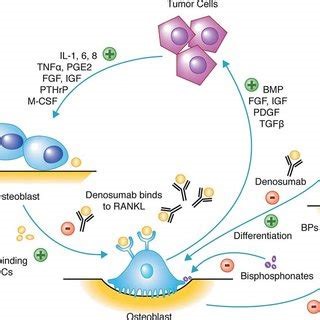Research remains an essential part of cancer care. In this blog, we will provide information about recent updates or new approvals as it applies to breast cancer written by Dr. Sharon Wilks.
Long-term use of Aromatase Inhibitors (AI) for endocrine blockade for postmenopausal women with hormone receptor positive breast cancer has been a well-established treatment for several decades in the early setting. One complication of this therapy which is generally taken for at least five or more years by women with breast cancer is bone mineral density losses and increased fracture risk. Several research efforts have been in place to evaluate the role of additive measures to reduce bone fracture risk in patients who take AI therapy. A more contemporary approach has been the use of a drug known by its brand name as Prolia® and generically as Denosumab. This drug allows for improvement in bone density in patients with or without a history of cancer. It falls under a category of a Rank Ligand inhibitor.
The results of this study were presented at the 2022 ASCO (American Society of Clinical Oncology) by Dr. Michael Gnant et al. This was a multicenter study involving 58 centers in Austria between 2006 & 2013. Patients were randomly assigned to Denosumab 60 mg SQ every six months versus placebo. A variety of endpoints were established including time to onset of a first fracture and then secondary endpoints included Disease Free Survival (DFS), Bone Metastases Free Survival (BMFS) and Overall Survival (OS). For this final report, individuals on study were followed for a median of eight years and all patients evaluated had completed all of their assigned five years of therapy with Denosumab or placebo therapy.
Remarkably, this agent for bone density health significantly reduced bone fracture risk but improvement in DFS, BMFS and OS (the latter improved by 20%) were also demonstrated.
How does a drug for osteoporosis prevent breast cancer recurrence you might ask?
Denosumab is known to target a protein in bones called RANKL which influences the activity of Osteoclasts. (These are the cells that lead to bone resorption, bone loss and reduced bone mineral density.) This agent, like Zolendronic acid (Zometa®), appears to have an effect on the operations / regulatory systems of the bone marrow environment that can also impact tumor growth signals.
Numerous preclinical studies showed that the use of these agents to tumor cell lines led to reduction of cancer growth. Data evaluating Zolendronic acid showed key inhibition of tumor angiogenesis, tumor invasion, diminished tumor adhesion to bone, and stimulation of immune surveillance for tumor cell recognition (work by DR. GR Mundy et al in the National Review of Cancer 2002; 2(8): 584-493).
The addition of Zolendronic acid to anticancer therapy also enhanced tumor reduction and disease control. Data from early research trials also found to reduce bone marrow and bone metastases. Work by Lin et al reported in the EBCC 2008 showed use of Zoledronic acid on an annual infusion of 4 mg IV reduced bone marrow micrometastases by 77% at one year. Another work by L/ Mystkidou et al in Medical Oncology showed a 12-month bone metastases free survival (BMS) of 60% in patients with advanced solid tumors that received an annual infusion of Zoledronic acid compared to 10% that had a BMFS rate that received placebo.
Now with the recent ASCO 2022 presentation, we have several emerging prospective reports that included women with early stages of breast change which have shown both Zolendronic acid and Denosumab reduce bone metastases and improve cancer survival rates while reducing bone fractures.
Thanks to research we now have a treatment option that “kills two birds with one stone.” Though we have success with these agents in cancer progression and recurrence, we still see that there are patients who still go on to progress and die from breast cancer and other malignancies. Continued ongoing efforts with research remains essential to finding ways to reduce cancer deaths and solve emerging issues and complications of effective therapy like seen with Aromatase inhibitor therapy. We encourage patients to continue to consider research when it is offered and made available. We also encourage those with cancer to find research opportunities when they are looking for new treatments for their disease.

